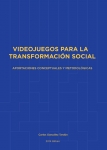Videojuegos Para La Transformación Social Aportaciones Conceptuales Y Metodológicas
Abstract Category: Education
Course / Degree: Doctorado en Ocio y Desarrollo Humano
Institution / University: Universidad de Deusto, Spain
Published in: 2014
Videogames have been one of the main inroads into the constant line of renewal and modernization of leisure forms in the last half of the 20th century and the beginning of the 21st century. In addition to their ludic importance, they have played a subtle role as tool for social transformation. However this aspect has been barely studied because, apparently, it has been an unintentional, collateral effect of the videogame industry. In the last few years this tendency has changed. The potential of videogames as tool is being recently glimpsed in fields distant from entertainment, and projects are being developed which aim is, clearly, social transformation in a conscious, active, and direct way.
This thesis is a theoretical and practical contribution to clarify the potential of videogames as tools for social transformation. To do this a conceptual clarification of the terminology used in the videogames field is made; the historical process of interaction between society and videogames is shown; research is carried out on serious videogames and the phenomenon of gamification when used as tools for social transformation; and, finally, the use of videogames is analyzed as tool for digital alphabetization in the international project One Laptop Per Child.
Three types of methodologies mainly were used in this work: content analysis, qualitative analysis, and quantitative analysis. The methodology of content analysis consisted of the review of literature and other means of the field of study, the examination of reference works and the extraction, comparison and discussion of their main hypothesis. The application of qualitative methodology was used for the analysis of the structure of videogames, their implicit message and the psychosocial impact they provoke. As well, non-structured and mixed research interviews were made to different professionals. For the quantitative analysis were used longitudinal data of downloads and categorical data obtained by means of two instruments created on purpose for this thesis. Several statistic techniques such as frequency analysis, correlation analysis, reliability analysis or linear regression analysis, among others were applied.
The results of this thesis show the incipient potential of serious videogames and gamification as tool for direct social transformation in several fields: education, health improvement, the closing of the digital divide, improvement of work performance, etc. A proposal is presented for their optimization and there are highlighted some of the main limitations and problems that can arise from their implementation.
[https://www.academia.edu/7228290/Tesis_Doctoral_Videojuegos_para_la_Transformaci%C3%B3n_Social]
Thesis Keywords/Search Tags:
video games, gamification, psychology, education, OLPC, serious games
This Thesis Abstract may be cited as follows:
González Tardón, C. (2014). Videojuegos para la transformación social. Aportaciones conceptuales y metodológicas. Tesis Doctoral. Universidad de Deusto, España. [https://www.academia.edu/7228290/Tesis_Doctoral_Videojuegos_para_la_Transformaci%C3%B3n_Social]
Submission Details: Thesis Abstract submitted by Carlos Gonzalez Tardon from Spain on 28-Feb-2015 17:03.
Abstract has been viewed 2229 times (since 7 Mar 2010).
Carlos Gonzalez Tardon Contact Details: Email: web@carlosgonzaleztardon.com
Disclaimer
Great care has been taken to ensure that this information is correct, however ThesisAbstracts.com cannot accept responsibility for the contents of this Thesis abstract titled "Videojuegos Para La Transformación Social Aportaciones Conceptuales Y Metodológicas". This abstract has been submitted by Carlos Gonzalez Tardon on 28-Feb-2015 17:03. You may report a problem using the contact form.
© Copyright 2003 - 2025 of ThesisAbstracts.com and respective owners.
